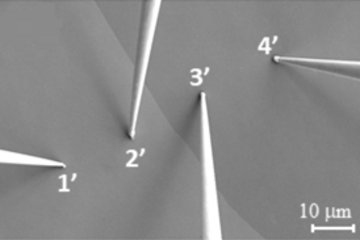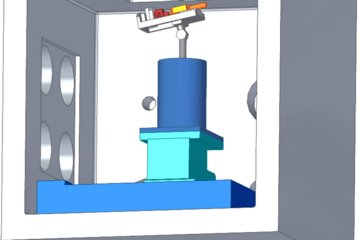All genres
381.
Talk
Enhancing mechanical properties of calcite by Mg substitutions: A quantum-mechanical study. Multiscale design modeling 2010, Brno, Czech Republic (2010)
382.
Talk
Thermodynamic data of Fe-based alloys derived from first principles. MRS Spring Meeting 2010, Boston, MA, USA (2010)
383.
Talk
Crystal mechanics of the martensitic transformation: Crystal plasticity, ab initio models, experiments. Colloquium Lecture, Institute for Mechanics, University of Dortmund, Dortmund, Germany (2010)
384.
Talk
Using ab-initio based multiscale models and experiments for alloy design. Colloquium Lecture, Institute for High Performance Computing, Agency of Science, Technology and Research, Singapore City, Singapore (2010)
385.
Talk
Phase stabilities of metals at finite temperatures: Ab initio meets CALPHAD. 468. WE-Heraeus-Seminar, Ab intio Description of Iron and Steel (ADIS2010): Mechanical Properties, Ringberg, Germany (2010)
386.
Talk
First principles determination of phase transitions in magnetic shape memory alloys. Multiscale Materials Modelling, Freiburg, Germany (2010)
387.
Talk
Interaction of H with vacancies in iron and steels: The combination of atomistic, thermodynamic and elastic effects. MMM 2010 Conference, Freiburg, Germany (2010)
388.
Talk
Combining ab-initio based multiscale models and experiments for structural alloy design. Colloquium Lecture, Australian Microscopy & Microanalysis Research Facility, The University of Sydney, Sydney, Australia (2010)
389.
Talk
Ab initio based multi-scale approaches to the elasticity of polycrystals. ICAMS Scientific Retreat, Akademie Biggsee, Attendorn, Germany (2010)
390.
Talk
Integrating finite temperature magnetism into ab initio free energy calculations. ICAMS Scientific Retreat, Akademie Biggesee, Attendorn, Germany (2010)
391.
Talk
Integrated approach to derive thermodynamic data for pure Al and Al alloys up to the melting point. Psi-k Conference 2010, Berlin, Germany (2010)
392.
Talk
First-principles study of the Ti-Fe eutectic system. Seminar at Institute of Physics of Materials at Czech Academy of Sciences, Brno, Czech Republic (2010)
393.
Talk
Ab Initio Interfacial Austenite/Martensite Energies for Accurate Deformation Mechanism Maps in High-Mn Steels. Materials Science and Engineering 2010, Darmstadt, Germany (2010)
394.
Talk
The thermodynamics of Fe-based compounds derived from first principles. Materials Science and Engineering 2010, Darmstadt, Germany (2010)
395.
Talk
First-principles study of the Ti-Fe eutectic system. Materials Science and Engineering 2010, Darmstadt, Germany (2010)
396.
Talk
Ab initio study on the cross-interaction between magnetism and point defects in fcc Fe. Realistic Theories of Correlated Electrons in Condensed Matter, Volga-River, Moscow, Russia (2010)
397.
Talk
Ab initio prediction of thermodynamic data for selected phases of the Al-Mg-Si-Cu system. CECAM Summer School on Computational Materials Sciences, San Sebastian, Spain (2010)
398.
Talk
Using ab initio methods to predict thermodynamic properties of metals. Summer School: Computational Materials Science, San Sebastian, Spain (2010)
399.
Talk
Ab initio Bestimmung thermodynamischer Eigenschaften des Legierungssystems Fe-Mn-C. Sitzung FA Computersimulation der DGM, Aachen, Germany (2010)
400.
Talk
Growth process, characterization and optoelectronic properties of InAsSbP dot-pit cooperative nanostructures. VCIAN 2010, Santorini, Greece (2010)











